Story by By Rhea Mogul, Vedika Sud and Sania Farooqui, CNN •
The bulldozers and government officials arrived just before dawn, tearing down the row of shanties as its bewildered residents watched inconsolably nearby.
“We were so frightened,” said 56-year-old Jayanti Devi as she attempted to salvage what was left of her belongings in the heart of New Delhi. “They destroyed everything. We have nothing left.”
For the past 30 years her home had stood on a decrepit pavement, next to an open sewage drain, opposite the sprawling Pragati Maidan complex, a prominent convention center in the Indian capital that will this week host leaders of the Group of 20 (G20) nations.
But the dwelling is not what US President Joe Biden, France’s Emmanuel Macron, or British Prime Minister Rishi Sunak will see as they arrive for the pivotal summit.
Devi is among tens of thousands of New Delhi’s most marginalized residents who have been evicted from their homes in the lead up to the G20 meeting, as authorities embark on a mass demolition drive in neighborhoods across the city.
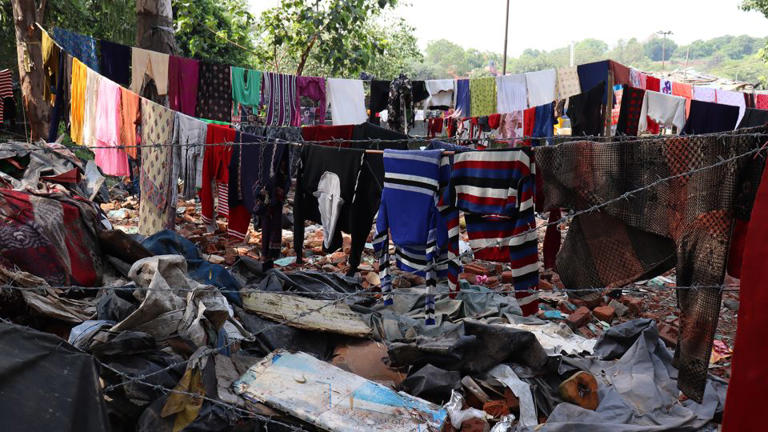
Clothes hanging to dry near demolished houses opposite Pragati Maidan. - Rhea Mogul/CNN© Provided by CNN
The government justified the demolitions by saying the structures are “illegal” and has said it intends to rehome some of the affected communities.
But activists have questioned the timing, claiming instead that the demolitions are part of a “beautification” project – a campaign to rid the city of its beggars and slums – to impress foreign dignitaries.
The image of India that Prime Minister Narendra Modi wants to project at the G20 is one of a modern superpower, a leader of the Global South, and a voice for impoverished nations. But the government has been accused of hiding one of the country’s own most entrenched and enduring problems.
“What strikes me most is that India, the Indian state, is ashamed of ostensible poverty,” said Harsh Mander, a social activist who works with homeless families and street children. “It doesn’t want poverty to be visible to the people who come here.”
In a written response in parliament in July, the Indian government denied any links between the demolitions of homes and the G20 summit.
CNN has reached out to the New Delhi and federal governments but is yet to receive a response.
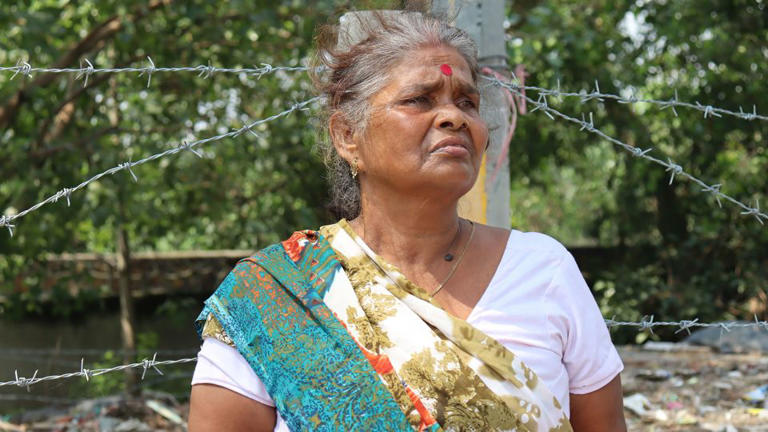
Jayanti Devi stands amid the rubble of what was her home of 30 years.
- Rhea Mogul/CNN© Provided by CNN
‘Why now?’
Delhi has long been a city of glaring disparities.
It’s a city where millionaires live in gleaming mansions next to homeless families on footpaths nearby, and where children sell toys to passengers in cars as they stop at traffic lights. It’s a city that attracts tremendous business, yet the demand for jobs grows increasingly acute.
Around 16 million people live in the capital, according to the latest government census from 2011, but only 23.7% of them live in “planned” or “approved” neighborhoods, according to a report by the New Delhi-based think tank, Centre for Policy Research.
The rest live in designated slums, villages, and unauthorized neighborhoods.
In April, Savita and her four daughters watched in despair as government authorities drove into their settlement – an unauthorized neighborhood – next to the 14th century Tughlaqabad Fort, an iconic Delhi monument, breaking down their small home and reducing seven years of memories to rubble.
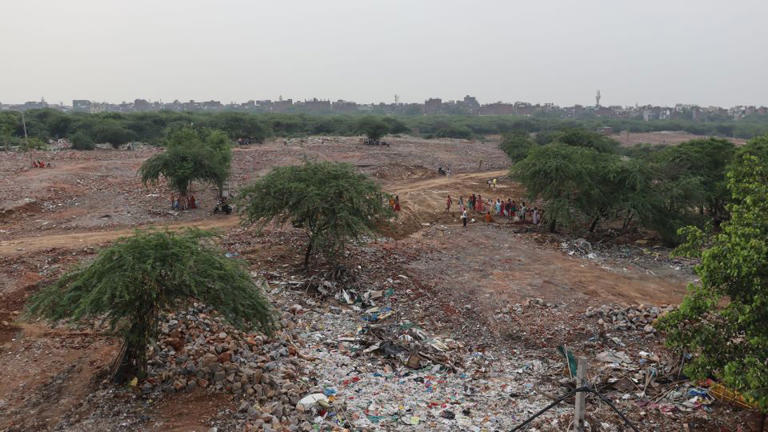
Hundreds of homes demolished next to New Delhi's Tughlaqabad Fort. - Rhea Mogul/CNN© Provided by CNN
“I can’t explain how distraught everyone was as they bulldozed the homes,” Savita said. “People were screaming, crying, begging them to stop.”
The Archaeological Survey of India (ASI), which carried out the demolitions, claims Savita and her neighbors had encroached on the land and illegally constructed their homes, according to court documents seen by CNN. In a notice to the residents in January, the ASI directed all “encroachers” to remove “illegal constructions at their own cost within a period of 15 days,” court documents show.
The ASI did not respond to requests for comment.
Savita said she knew her family was purchasing land in an unauthorized colony when they built their home in 2016.
“We knew the risk we were taking. But we are poor and it’s all we could afford,” she said. “People have been living here for over 40 years. Why didn’t authorities demolish these homes earlier. Why now?”
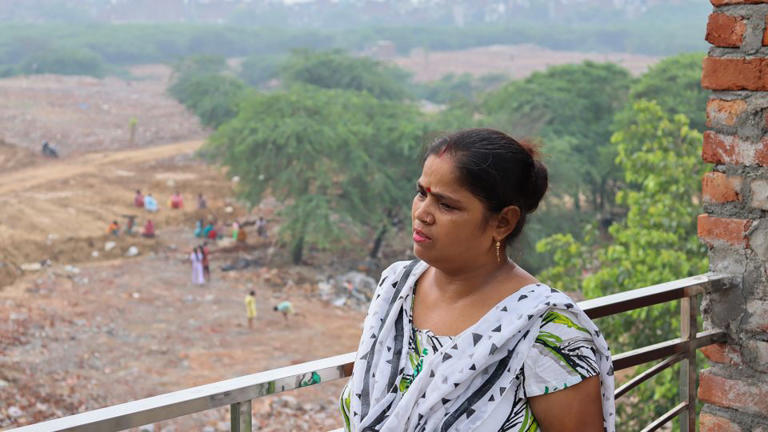
Savita looks over what was once her home of seven years.
- Rhea Mogul/CNN© Provided by CNN
Homeless and hungry
More than 100,000 residents living in the Tughlaqabad area lost their homes in April, according to a Supreme Court petition filed by a lawyer assisting the residents.
With nowhere to go and no money to rent an apartment, many including Savita’s family had no choice but to live under tarpaulin sheets on the rugged land, even as torrential rains and floods battered the city.
In the day time, they begged policemen nearby for some bread to share between the six of them. On one occasion at night, she said, men tried to snatch her neighbor’s daughter, pulling the screaming teen into the dark woods.
“We endured this hardship for six weeks,” Savita said through tears. Forced to study next to mounds of garbage as stray dogs and cows rummaged through decaying food, her daughters struggled with their school work, becoming depressed and withdrawn.
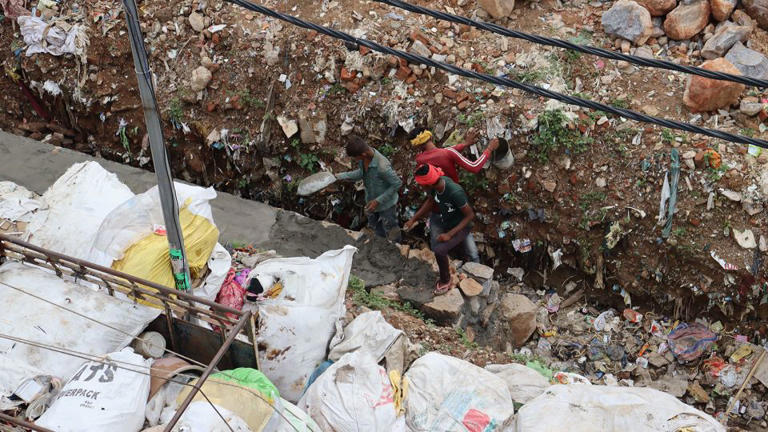
Workers build a wall near Savita's home
. - Rhea Mogul/CNN© Provided by CNN
This isn’t the first time that an Indian government has carried out slum or shanty demolitions ahead of a large-scale international event.
In 2010, when the now opposition Indian National Congress was in power, beggars were forced to move from the streets of New Delhi and slums were destroyed in the lead up to the Commonwealth Games, upending the lives of tens of thousands in the capital.
Mander, the social activist, said it was unfair of the government to target poor families for living on unauthorized land.
“The government does not acknowledge that illegality has been imposed on these poor people,” Mander said. “That’s because this city has been planned in a way where there is no place for them to live legally. The demolitions are being done with extreme cruelty.”
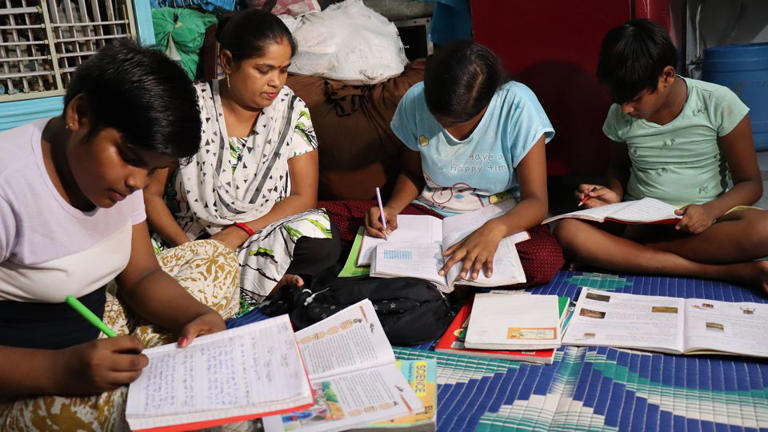
Savita helps her children with homework at a temporary home in Delhi
This isn’t the first time that an Indian government has carried out slum or shanty demolitions ahead of a large-scale international event.
In 2010, when the now opposition Indian National Congress was in power, beggars were forced to move from the streets of New Delhi and slums were destroyed in the lead up to the Commonwealth Games, upending the lives of tens of thousands in the capital.
Mander, the social activist, said it was unfair of the government to target poor families for living on unauthorized land.
“The government does not acknowledge that illegality has been imposed on these poor people,” Mander said. “That’s because this city has been planned in a way where there is no place for them to live legally. The demolitions are being done with extreme cruelty.”

Savita helps her children with homework at a temporary home in Delhi
- Rhea Mogul/CNN© Provided by CNN
The Delhi government has said it intends to rehabilitate Savita and her family – but she says no help has arrived so far and is fighting her case in court. Her family is now temporarily living with a relative in a two-bedroom apartment in a crowded and narrow shanty settlement.
The stench of cow dung engulfs the gulleys, where thousands of flies swarm outside doors and mangy cats roam the alleyways.
“My children don’t like it here,” Savita said. “They ask me why this is happening to us. What can I tell them?”
Leader of the Global South
Since assuming the presidency of the G20 this year, India, the world’s new most populous nation of 1.4 billion, has positioned itself as a leader of emerging and developing nations – often referred to as the Global South – at a time when consumers are being hammered by soaring food and energy prices as a result of Russia’s invasion of Ukraine.
Modi sees India as a confident and modern superpower, a voice for the voiceless seizing the 21st century. Last month India celebrated successfully conducting a soft moon landing, becoming only the fourth country in the world to achieve such a feat.
Speaking to Congress during a highly publicized trip to the United States in June, Modi said “giving a voice to the Global South is the way forward.”
As war continues to throw the global economy into chaos, India has signaled an intention to raise the many concerns faced by the Global South, including climate challenges and food and energy security.
“The world looks upon the G20 to ease the challenges of growth, development, economic resilience, disaster resilience, financial stability, transnational crime, corruption, terrorism, and food and energy security,” Modi said in February.
However, activists point out the irony in that image, when India’s poorest are struggling at home.
“People are dying on the streets in the cold winter and we are demolishing homes,” Mander said. “There must be a fundamental right to life… to live with dignity.”
‘Poverty makes us powerless’
Standing amid the rubble of her home of seven years, Savita said she had so many dreams for her family.
“I wanted my children to grow up here. I wanted to give them a stable upbringing,” she said.
Now, security guards patrol the Tughlaqabad area as construction workers build a wall to seal the land. “Where were you the day bulldozers took our home?” residents asked the guards angrily. “Why didn’t you come to help us?”
Devi, from the Pragati Maidan area, is now forced to live in a makeshift tent on a nearby sidewalk, with no relief from the blistering summer heat.
She says no one has helped her find alternative shelter.
Selling tea and snacks to make ends meet, surrounded by decaying garbage and an open sewage drain that attracts hundreds of mosquitoes and flies, she feels defeated and alone.
“We’re so angry, but our poverty makes us powerless,” Devi said. “We can’t speak up.”
The Delhi government has said it intends to rehabilitate Savita and her family – but she says no help has arrived so far and is fighting her case in court. Her family is now temporarily living with a relative in a two-bedroom apartment in a crowded and narrow shanty settlement.
The stench of cow dung engulfs the gulleys, where thousands of flies swarm outside doors and mangy cats roam the alleyways.
“My children don’t like it here,” Savita said. “They ask me why this is happening to us. What can I tell them?”
Leader of the Global South
Since assuming the presidency of the G20 this year, India, the world’s new most populous nation of 1.4 billion, has positioned itself as a leader of emerging and developing nations – often referred to as the Global South – at a time when consumers are being hammered by soaring food and energy prices as a result of Russia’s invasion of Ukraine.
Modi sees India as a confident and modern superpower, a voice for the voiceless seizing the 21st century. Last month India celebrated successfully conducting a soft moon landing, becoming only the fourth country in the world to achieve such a feat.
Speaking to Congress during a highly publicized trip to the United States in June, Modi said “giving a voice to the Global South is the way forward.”
As war continues to throw the global economy into chaos, India has signaled an intention to raise the many concerns faced by the Global South, including climate challenges and food and energy security.
“The world looks upon the G20 to ease the challenges of growth, development, economic resilience, disaster resilience, financial stability, transnational crime, corruption, terrorism, and food and energy security,” Modi said in February.
However, activists point out the irony in that image, when India’s poorest are struggling at home.
“People are dying on the streets in the cold winter and we are demolishing homes,” Mander said. “There must be a fundamental right to life… to live with dignity.”
‘Poverty makes us powerless’
Standing amid the rubble of her home of seven years, Savita said she had so many dreams for her family.
“I wanted my children to grow up here. I wanted to give them a stable upbringing,” she said.
Now, security guards patrol the Tughlaqabad area as construction workers build a wall to seal the land. “Where were you the day bulldozers took our home?” residents asked the guards angrily. “Why didn’t you come to help us?”
Devi, from the Pragati Maidan area, is now forced to live in a makeshift tent on a nearby sidewalk, with no relief from the blistering summer heat.
She says no one has helped her find alternative shelter.
Selling tea and snacks to make ends meet, surrounded by decaying garbage and an open sewage drain that attracts hundreds of mosquitoes and flies, she feels defeated and alone.
“We’re so angry, but our poverty makes us powerless,” Devi said. “We can’t speak up.”
SEE
No comments:
Post a Comment